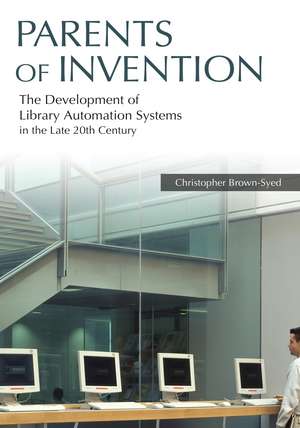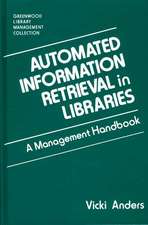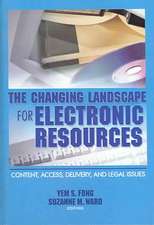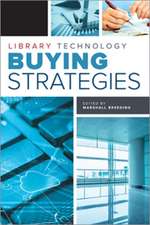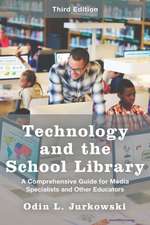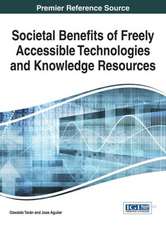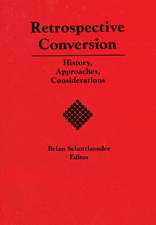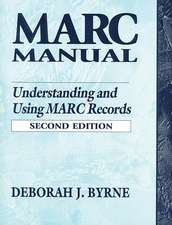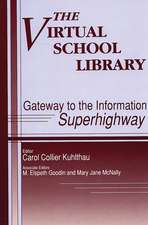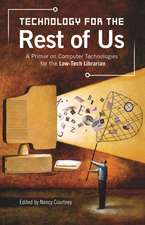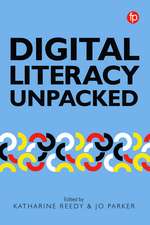Parents of Invention: The Development of Library Automation Systems in the Late 20th Century
Autor Christopher Brown-Syeden Limba Engleză Paperback – 6 iun 2011 – vârsta până la 17 ani
Preț: 352.87 lei
Preț vechi: 433.07 lei
-19% Nou
Puncte Express: 529
Preț estimativ în valută:
67.52€ • 70.50$ • 55.88£
67.52€ • 70.50$ • 55.88£
Carte tipărită la comandă
Livrare economică 05-19 aprilie
Preluare comenzi: 021 569.72.76
Specificații
ISBN-13: 9781591587927
ISBN-10: 1591587921
Pagini: 172
Dimensiuni: 178 x 254 x 11 mm
Greutate: 0.37 kg
Editura: Bloomsbury Publishing
Colecția Libraries Unlimited
Locul publicării:New York, United States
ISBN-10: 1591587921
Pagini: 172
Dimensiuni: 178 x 254 x 11 mm
Greutate: 0.37 kg
Editura: Bloomsbury Publishing
Colecția Libraries Unlimited
Locul publicării:New York, United States
Caracteristici
Interviews with CEOs of libraries and computer companies, programmers, librarians, and library directors from Australia, Canada, the United Kingdom, and the United States
Notă biografică
The late Christopher Brown-Syed was editor of the journal Library & Archival Security; and taught at Seneca College, Toronto, Ontario, Canada.
Cuprins
ForewordCommonly Used Terms and AbbreviationsAcknowledgmentsInterviewsIntroduction1. Origins of MagicEra of ConceptualizationEra of CommercializationMaking Systems as Error Free as PossibleAdvent of Bibliographic UtilitiesDeveloping National BibliographiesProgramming Languages and ILSBibliographic Databases, Bibliographic Utilities, and Regional Library Consortia2. Customers' PerspectivesA First Experience of ComputingUser ManualsConsortia Customers and VendorsBurlington Public LibraryA View from AustraliaCLANN Goes OnlineAUSMARCAuthority FilesMARC RecordsCommunication LinesIncorporating Research DatabasesAARNET and JANETCD-ROMThe Customer and the ILS Vendor3. At the Interface: Librarians and the Vendor EnvironmentWorking ConditionsBeing on the RoadFair Warning at HiringLibrarians as TrainersLibrarians as Project Managers4. The Nature of the Vendors' WorkAge of RespondentsEducation and Training of RespondentsTypes of Work PerformedJob SatisfactionWork EnvironmentFinancial BenefitsSummary5. On Company TimeSocial: Cohesion and Group IdentityRecreation or Learning6. TransformationsCampus MainframesPlessey Data SystemsBatch Mode Circulation Systems: York UniversityGeac Library Information SystemUpgrades and MigrationsRequests for InformationThe RFP ProcessTransformations: The TechnologiesTransformations: Technical AspectsCharacteristics of the Bibliographic DataSmall Capacities and Compact Computer CodeCirculation TransactionsCataloguing and AuthoritiesOvernight ProcessingLocal Initiatives and a Typical Offline-Processing CycleGeneral Indications of System Activity and Database ContentsRAT 40KComputers and PeripheralsMainframes, Minis, Superminis, and MicrosData Structures and Transactions-The Case of NOTISLibrary Requirements, Data Representation, and TransactionsA Circulation ScenarioAccommodating Library PoliciesAcquisitions Systems7. Consolidation and Lasting AchievementsThe Business of Library AutomationChanging Business ModelsProduct MaturationCompetition Among VendorsThe Age FactorAdvances in Computing and Information ScienceEnd of an EraConclusions8. The Future of Library TechnologyLouise O'NeillIntegrated Library SystemsOpen Source SoftwareIncreased Focus on Library Users' Experience of TechnologyDescription and Discovery ToolsNonlocal Information Resources and DeliveryMobile and Ubiquitous AccessOther Library Technology Future DirectionsInstitutional and Digital Repositories and Open AccessLibraries as PublishersAdoption and Convergence of Library and Nonlibrary TechnologiesFuture Librarians and TechnologyIndex
